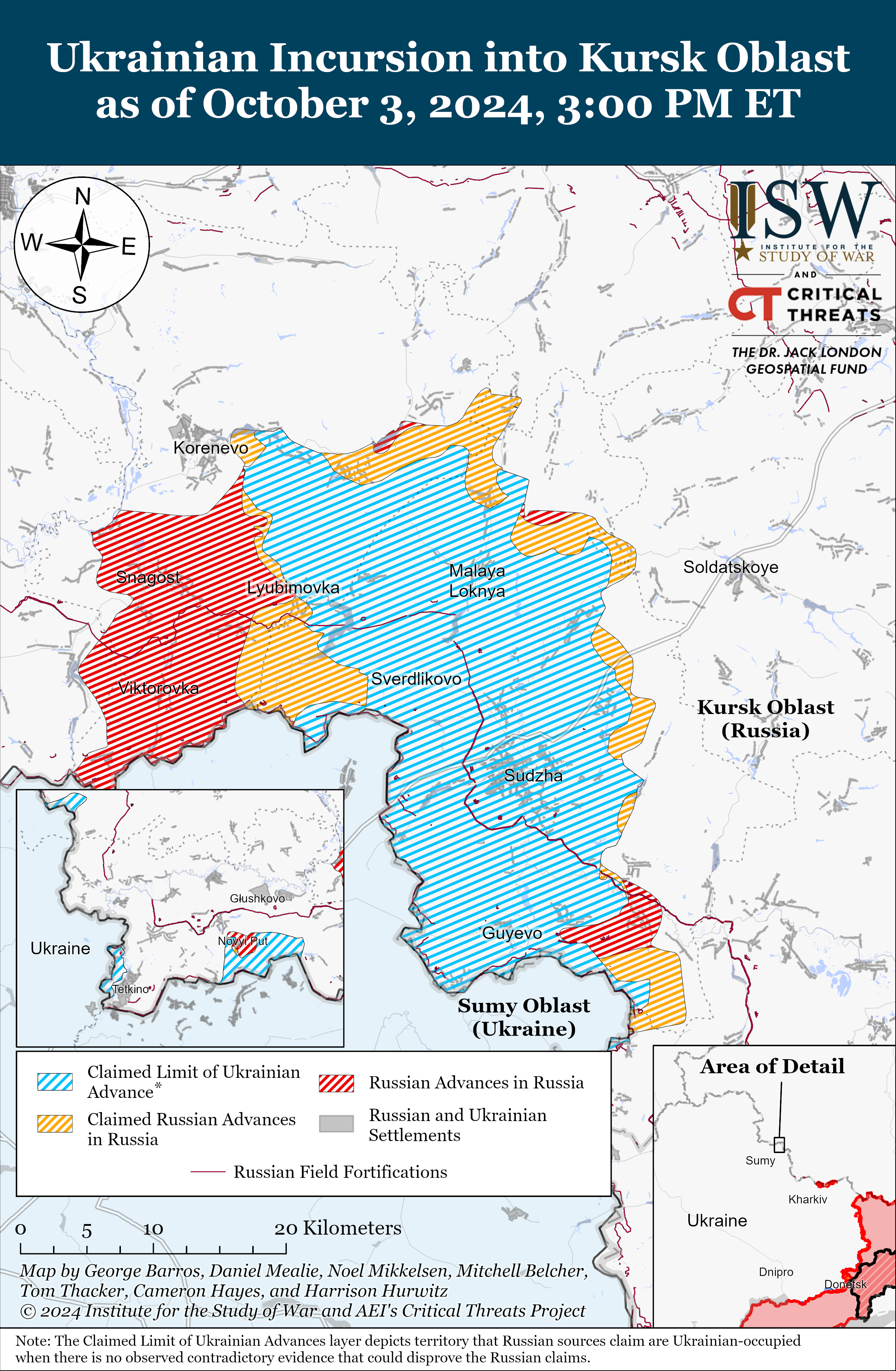Ukraine War Update: Kursk Battle is Turning into a Stalemate
Bottom Line: After Ukraine’s offensive inside Russia's western Kursk region started early August, it seems the Russian military command is continuing to prioritize offensive operations in priority sectors of the frontline over long-term planning for Russia's theater-wide campaign in Ukraine as Russian offensives produce gradual tactical gains rather than significant gains. Ukrainian incursion into Kursk oblast appears to have significantly complicated the development of Russia's operational reserves. We now feel the battle in Kursk region is turning into a stalemate as neither side makes major advances and winter is coming. It is still uncertain whether Kursk operation will be a game changer and increase Ukraine’s bargaining position at any negotiations in the future if Trump is reelected as U.S. president and likely leading to a probable Russia-friendly peace deal in 2025, while Trump reiterates he remains determined to end the war very quickly if reelected.
Figure 1: The Military Situation in Kursk Oblast, October 3

Source: Institute for the Study of War (ISW)
Russian Offensives in Ukraine Produce Gradual Tactical Gains Rather Than Significant Gains
According to ISW, the Russian offensive effort in eastern Ukraine that began in fall 2023 continues to produce gradual Russian tactical gains in specific sectors of the front, but operationally significant gains will likely continue to elude Russian forces. Ukrainian forces are conducting an effective defense in depth along the frontline, inflicting significant losses upon Russian forces while slowly giving ground but preventing the Russian military from making more rapid gains on the battlefield.
Despite strong defensive operations, Ukrainian forces continue to face serious operational challenges and constraints, which are providing Russian forces with opportunities to pursue tactically significant gains. ISW assesses that Russian forces do not have the available manpower and materiel to continue intensified offensive efforts indefinitely, however, and current Russian offensive operations in eastern Ukraine will likely culminate in the coming months, if not weeks.
Sources also cite that the Russian government is planning to further increase defense spending in 2025, although Kremlin officials appear to be highlighting planned social spending while avoiding discussions of increased defense spending, which partly demonstrates that the country is preparing for the continuation of the war.
In addition to this, Russian authorities continue to influence the Western debate about allowing Ukraine to use Western-provided weapons to conduct long-range strikes against military objects in Russia. In a similar vein, we see Russian President Putin threatens West about the possibility of a nuclear confrontation between Russia and the West, likely in order to exert further control over Western decision-making. We think the use of any tactical nuclear weapons remains unlikely for now.
Kursk Battle Turns into a Stalemate as the Winter is Approaching
We feel the battle in Kursk turns into a stalemate as neither side makes major advances and winter is now coming. The Russian military reportedly continues to deploy forces from lower priority sectors of the frontline in Ukraine to the frontline in Kursk Oblast as the operation pushed Russia to draw some of its forces, and forced Russia to the defensive positions, causing the pace of Russian offensive operations in Ukraine moderately decelerates.
As noted in our last update in September, we believe it will be hard for Ukraine to sustain the operation whilst Russia continues to bring more artillery and aviation, but it seems harsh winter conditions will likely help Ukrainians to hold their positions.
We continue to think the U.S. presidential elections would finally set the scene in Ukraine and in Kursk, and we envisage the former U.S. President Trump will likely not provide firm backing for Ukraine, if elected. President Putin continues to wait for the possibility of a Trump win and splits western support and leading to a Russia friendly peace deal with current territories, but the impacts of the incursion could moderately change the game, likely less land to Russia in 4 occupied regions.
A Harris victory would see more support for Ukraine, but eventually a push from the U.S. to reach some peace deal given the deadlock on the war is likely late 2025 or early 2026.
Trump Remains Determined to End the War if Reelected
Speaking about war in Ukraine after meeting with Zelensky last week, former U.S. President Donald Trump stated that “We both want to see the war end, and we both want to see a fair deal made,” and added “It should stop and the President (Zelensky) wants it to stop, and I’m sure President Putin wants it to stop and that’s a good combination.”
Trump underscored that "I also have a very good relationship as you know with President Putin and I think if we win [the election] we’re going to get it resolved very quickly." Interestingly, Trump also emphasized on his Truth Social account that if he is not elected president, "that war will never end, and will phase into World War III".
On Ukrainian front, President Zelensky indicated after meeting with Trump that “We have a common view that the war in Ukraine must be stopped. Putin cannot win. Ukrainians must win.” Zelensky told the New Yorker magazine that he believes Trump doesn't really know how to stop the war, which was then criticized by Trump.
Zelensky also met with U.S. president Biden and vice president Harris on November 27 at the White House to discuss his victory plan, which he hopes will pressure Russia into agreeing a diplomatic end to the war. We foresee this remains less likely under current circumstances, particularly taking into account that Russian MFA Spokesperson Zakharova said late September that Russia will not participate in Ukraine's second peace summit later in 2024, or in any such summits in the future.